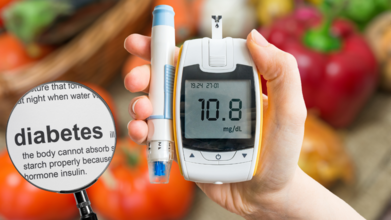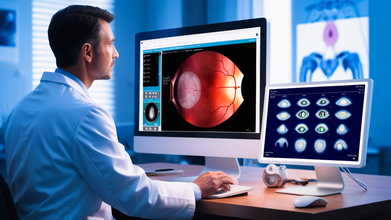- Health Conditions A-Z
- Health & Wellness
- Nutrition
- Fitness
- Health News
- Ayurveda
- Videos
- Medicine A-Z
- Parenting
- Web Stories
Is Skipping Exercise Worse for Diabetes Than Eating Sugar?

Credits: Canva
If you think managing diabetes is just about cutting down on sweets, you might want to educate yourself. Blood sugar is only one aspect of managing diabetes. Your lifestyle, including how you move, sleep, and manage stress, plays an equally significant role in managing diabetes as your diet and medication.
The Sugar Myth
Most people picture diabetes as a “sugar disease”—caused by sweets and fixed by salads. But it’s not that simple. Dr Arush Sabharwal, Bariatric and Metabolic Surgeon at the Surgical Centre for Obesity and Diabetes Clinic, explains that ignoring exercise, staying constantly stressed, or skimping on sleep can seriously hampers diabetes control. “Diet is important, but without physical activity, quality sleep, and stress management, it’s very difficult to keep long-term complications at bay,” he says.
Also Read: Al Roker's Weight Loss Journey: Health Secrets That Keep Him Going At 71
Why Skipping Exercise Is Like Skipping a Dose of Medicine
Exercise isn’t just about losing weight. It’s one of the most powerful tools for blood sugar control. Research shows that even moderate activity helps your body use insulin better, lowers blood glucose, and improves circulation. Dr Sabharwal points out, “Just 30 minutes of brisk walking, five times a week, is enough to bring blood sugars into the target range. Without activity, sugar levels soar, raising the risk of heart disease, nerve injury, and obesity.”
Dr Shankar Kumar Venkatarayaraju, Senior Consultant – Internal Medicines & Diabetologist at Sparsh Hospital, Bangalore, adds that many patients avoid workouts out of fear of low sugar or lack of time, but the cost of inactivity is steep. “Even moderate activities like cycling, yoga, or walking can improve insulin sensitivity, regulate weight, and boost energy levels,” he says. Skipping workouts is like leaving an essential medicine out of your treatment plan.
Sleep: The Night-time Sugar Regulator
Sleep is like your body’s inbuilt sugar reset button. Lose out on it, and things get messy. Poor or insufficient sleep raises cortisol, the stress hormone that makes blood sugar harder to control. Studies reveal that people with diabetes who sleep less than six hours tend to have higher glucose levels and greater difficulty managing them.
Dr Venkatarayaraju explains, “Good-quality sleep for 7–8 hours not only regulates hormones but also reduces cravings and stabilises energy levels.” Translation: fewer midnight fridge raids and less next-day fatigue.
What Does Stress Do?
Stress might feel like a mental issue, but it wreaks havoc on your blood chemistry. Unmanaged stress triggers the liver to release stored glucose, sending sugar levels on an unwelcome rollercoaster. Dr Sabharwal says, “Stress is one of the most underestimated factors in diabetes. Simple relaxation techniques like yoga, meditation, or even hobbies can significantly reduce glucose spikes.”
The Lifestyle Loop: How It All Connects
Exercise, sleep, and stress aren’t separate pillars but parts of a feedback loop. When you exercise regularly, your blood sugars stabilise, helping you sleep better. Good sleep gives you the energy to move more. Less stress means fewer cravings, making healthy choices easier. Neglect one, and the domino effect kicks in. Nurture all three, and you’ll find managing diabetes far less overwhelming.
Doctors emphasise that diabetes care is not a single-lane road but a whole lifestyle highway. As Dr Venkatarayaraju summarises, “Diet and medication are essential, but without movement, rest, and stress balance, they cannot deliver the best outcomes.” Small steps, like a brisk walk, a consistent bedtime, or ten minutes of deep breathing, can add up to huge improvements in quality of life.
Men Need To Work Twice As Hard As Women To Beat Heart Diseases: Study Reveals

(Credit-Canva)
Heart diseases affect women and men differently. This fact has been explored and understood by many different studies. A recent study published in Nature Cardiovascular Research shows that men have to work twice as hard to beat heart diseases than women. While previously, researchers have found that women are at a higher risk of dying from a heart disease. For instance, a study published in the Journal of Health Economics and Outcomes Research, pointed out that a lot of it is due to doctors not taking gender and sex differences into account.
The new study however, points that women may not need to exercise as much as men to gain significant protection against coronary heart disease. Why is there such a big difference in beating the odds for men and women?
How Is Heart Health Different for Men and Women?
The research comes from an observational study of over 85,000 UK adults tracked for about seven years using fitness tracker data. The research clearly shows that men and women need different amounts of exercise to keep their hearts safe. Women seem to get more "bang for their buck" when they exercise:
For Preventing Heart Disease:
Women who did about four hours of moderate exercise each week (think brisk walking) lowered their risk of getting heart disease by about 30%. Men on the other hand needed almost double that time—around eight hours a week—to get the same 30% protection!
If You Already Have Heart Disease:
The difference is even bigger here. Women who had previous heart problems saw their risk of death drop by three times compared to women who didn't exercise. In men with similar heart histories needed much more weekly exercise to get a similar life-saving benefit.
In general, active women had a 5% greater reduction in heart disease risk than active men. This shows that being active is great for everyone, but women might have a slight natural advantage.
What is Moderate Exercise?
It's important to know what kind of exercise we're talking about. Moderate exercise is any activity that gets your heart pumping but doesn't make you feel totally wiped out. Examples include a brisk walk, gardening, or a fast bike ride. Vigorous exercise is when you push your body harder, causing a bigger jump in your heart rate. Think running, swimming laps, or hiking up a steep hill.
The study confirms that any amount of activity is better than none for your heart. Researchers found a clear connection: the more you move, the lower your risk of heart disease and death.
Do Hormones Affect Your Heart Health?
Why do women get such a great benefit with less effort? The study authors point to two main reasons tied to the body's natural makeup:
Hormones
Women have higher levels of the hormone estrogen. Estrogen is thought to help the body burn fat more effectively during exercise. This could be one reason why women see better heart benefits.
Muscle Types
Men tend to have more "fast-twitch" muscles, which are great for quick, powerful movements (like sprinting). Women usually have more "slow-twitch" muscles, which are better for endurance and working efficiently for longer periods. This more "efficient" muscle type might make workouts more beneficial for heart health in women.
Should Doctors Tailor Treatment According To Gender?
It's also crucial to know that heart disease affects men and women differently. Doctors point out that women often develop heart problems later in life and, sadly, are sometimes less likely to get the standard tests and care for heart issues that men receive.
The findings suggest that public health advice should be personalized and recognize that men and women have different needs.
The most important takeaway is this: Talk to your doctor before you start any new fitness plan. Your perfect exercise routine depends on your current health, fitness level, and any existing medical issues. There is no one-size-fits-all plan!
'Felt Like Losing Control Of My Mind, And Sense Of Self', Reveals RTE Star Lottie Ryan About Her Perimenopause Experience

Credits: Canva
Lottie Ryan, Irish television and radio presenter with RTE opened up about her perimenopause experience and how she felt 'out of control' before she realized that changes in her body was going through were hormonal.
She revealed that she felt she was 'losing control', as reported by the Irish Sun. She said that she initially could not understand why she was feeling so off and blamed the symptoms on stress. However, only after she had a chat with her mother that she realized her issues could be hormonal.
After having a conversation with her mother, she booked a follow-up with a medical professional, who confirmed that her symptoms were due to perimenopause.
Also Read: What's New In Trump's Health? A Recent 'Perfect' MRI Scan And The Will To Serve A 'Third Term'
She spoke to Natural Life Magazine, and said, "At first I did not put two and two together, I just thought I was stressed, tired, maybe run down. It was not until I had a conversation with my mum about what she would gone through, then spoke to my childhood best friend, who is a women's health physio, that I started to thin, 'Hand on...this could be hormonal'."
She had recently turned 40, and recalled how her symptoms began to affect every part of her life. She said, "Before I knew what was going on, I felt like I was losing control of my mind, my memory, even my sense of self."
She further added, "One I got answers, it was like a fog lifted. I still have days where I have to manage things, but now I understand why they're happening, and that makes all the difference." She tells that what surprised her was the anxiety she started to feel. She revealed that she thought menopause was "about hot flushes and trouble sleeping". What she did not know was that it could affect your mental health. She says, "That was the biggest shock for me."
Read More: F.D.A. Approves New Non-hormonal Menopause Drug To Reduce Hot Flashes
What Is Perimenopause?
As per a 2019 study published in Journal of Clinical Obstetrics and Gynecology, perimenopause, or the menopausal transition, represents a period of time during which newly arising symptoms can present complex management decisions for providers. It is the period of time during which physiologic changes mark progression toward a woman's final menstrual period (FMP).
The phase begins with the onset of menstrual irregularities and continues until a woman reaches menopause, or one year after amenorrhea has occurred.
As Jean Miller, NP, at Franciscan Physician Network Winfield Health Center explains, "Perimenopause is the transition that occurs between a woman’s reproductive years and menopause, usually starting seven to ten years before the final period. It is important to remember that while this is a natural process, it is also one that varies for each woman, with some noticing little change and other experiencing more significant symptom."
Since the average age of menopause is 51, most women start to notice perimenopause symptoms in their 40s, which is also the case with Ryan.
Gynecologist psychiatrist Dr Nazanin Silver, writes for the American College of Obstetricians and Gynecologists that about 4 in 10 women have mood symptoms during perimenopause, which may be similar to PMS. She notes that women may feel irritable, have low energy, feel tearful and moody, or have a hard time concentrating.
She also notes that there are multiple studies that point out the increasing risk of depression during menopausal transition. Women may feel like they are crying a lot, feel hopeless or worthless, numb or lose interest from their liked and normal activities. Anxiety too is one of the symptoms.
Also Read: Fact Check: Does Moon Really Affect Your Sleep And Mental Health? Here's What A Neurologist Says
She suggests during this phase, it is important to "see your ob-gyn regularly and discuss how you are feeling". Finding help can help you enter this phase with ease.
Heart Diseases Risk and Aging Health Issues Could Be Predicted By A Simple Eye Scan: Study Showed 70% Accuracy

(Credit-Canva)
Heart diseases are one of the most common issues people face in the world. Despite being the leading cause of death globally, according to the world health organization, many people miss critical signs of it. The best way to ensure a person gets treatment, is that the disease must be diagnosed in its early stages. A new study suggests diagnosing the risk of heart disease early is also possible, with the help of eye scans.
Researchers at McMaster University and the Population Health Research Institute (PHRI) have made an incredible discovery. They found that the tiny blood vessels in your eyes could be a powerful way to guess how likely you are to develop heart disease and how fast your body is truly aging on the inside. This is a big deal because right now, checking for these risks involves many complicated tests.
The study, which was published in the journal Science Advances, suggests that soon, doctors might be able to use a simple scan of your retina, which is the back of your eye, as a quick and non-invasive tool. This scan could show them the overall health of your blood circulation and reveal your body’s real biological age. This new method could open up amazing possibilities for catching serious health issues much earlier.
Can You Diagnose Heart Diseases From Eye Scan?
The study was massive, involving over 74,000 people from large international research groups. The scientists analyzed their retinal images, genetic makeup, and blood data.
Their key discovery was striking, people whose blood vessels in the retina were simpler and looked less branched (not as tree-like) were found to be at a higher risk for heart problems. These same people also showed clear signs of faster biological aging, meaning they had more inflammation in their bodies and a potentially shorter life expectancy.
Dr. Marie Pigeyre, one of the main researchers on the study, explains that the eye is unique. It gives doctors a special, clear, and easy way to look at your entire circulatory system—all the veins and arteries that carry blood throughout your body.
Mirroring the Body
Think of the eye's small blood vessels like a mirror. Changes happening in these vessels reflect the same changes happening in the small blood vessels everywhere else in your body. If the vessels in your eye look unhealthy, chances are, the vessels around your heart and brain are also struggling.
Molecular Clues
The team didn't just look at pictures. By combining the retinal scans with genetic information and blood test results, they were able to uncover specific "molecular pathways." These are basically the biological rules or processes that explain exactly how aging causes problems in your blood vessel system.
Can You Cure Genetic Heart Diseases?
The researchers went beyond just finding a link; they used the blood and genetic data to hunt for the root causes of these eye vessel changes. This led them to pinpoint specific proteins that appear to be the main drivers of both aging and disease.
They identified two major proteins: MMP12 and IgG–Fc receptor IIb. Both of these are strongly linked to inflammation and the deterioration of blood vessels as we age.
Dr. Pigeyre is excited because these specific proteins could become targets for new drugs. Medicines designed to control or slow down these proteins could help reduce the impact of vascular aging, lower the risk of heart disease, and ultimately help people live longer and healthier lives.
Right now, to check for serious age-related diseases like heart disease, stroke, and memory problems (dementia), doctors have to perform many different tests. The big hope is that a quick, simple retinal scan could one day become an easy-to-access tool to immediately check a person's risk for heart problems and determine their biological age.
© 2024 Bennett, Coleman & Company Limited

